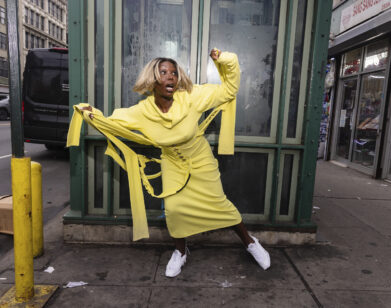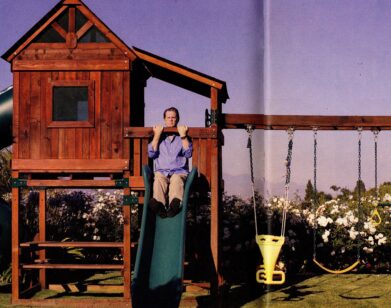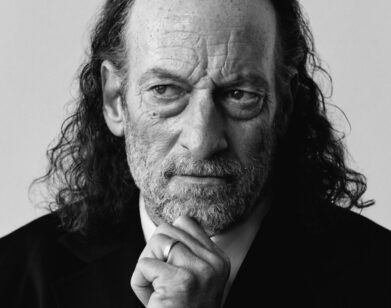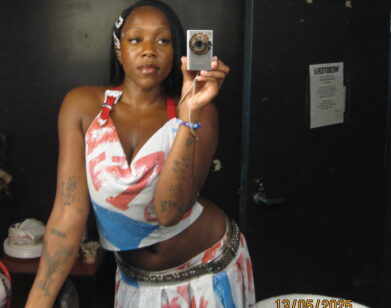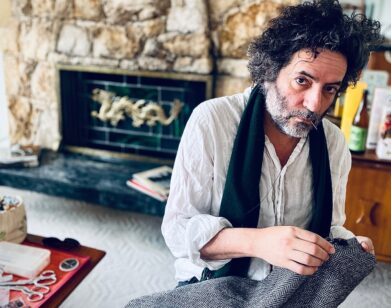On Her Latest Album ‘Rouge,’ The Malaysian Singer Yuna Finds Her Color

Photo by Steve Taylor.
On her latest album, Rouge, the R&B singer Yuna has finally found her color. “Red is the color of the woman I am today,” the Malaysian singer-songwriter says over a dinner of asam laksa at Laut, one of her must-visit stops when she’s in New York City. Yuna, born Yunalis binti Mat Zara’ai, was in law school in her home country before dropping out to pursue a career in music. The woman she is today might feel particularly different from the one she was back then. Since arriving to the U.S. at 23, the singer has worked with the likes of Usher and Tyler, the Creator, performed at Lollapalooza, and, as of a few months ago, has been signed under Wilhelmina models. Yuna has embarked on a new journey, one that involves mingling with Cardi B and Blackpink’s Jenni at Chanel runway shows—among other things. And although she’s more than happy to explore this side of her, Yuna is artist first and foremost, “not just a story.” She explains how, in her early interactions with labels, she wanted to be sure they were interested in what she had to say with her music. “The most difficult part was thinking, ‘Am I good enough? I was just trying to gage what people thought about me.” But nowadays, Yuna isn’t worried about what others think of her; instead, she’s taking her story into her own hands. Below, the soul singer talks on everything from the distinctions between Rouge and her first album—the critically acclaimed Chapters—to how the color of passion, anger, and most importantly, love inspired her to let her brightly rouged emotions burn.
———
ERNEST MACIAS: You originally went to law school, and music came after. Can you tell me about that?
YUNA: I was in law school in Malaysia. But what triggered me to do my own music was that I auditioned for Malaysian Idol. After I got eliminated, I locked myself in my bedroom, got my guitar out, and started writing and recording songs. I put my music up on MySpace. By the time I did it for six months or something, I got like a million views. So, I graduated and was still doing music. I was getting paid for it, so I was starting to get a stable income. I was like, “Maybe I could do this.” My parents were really supportive.
MACIAS: They were?
YUNA: The whole goal was to get out of Malaysia. Because no one has ever done that. I wanted that. People kept saying I was crazy.
MACIAS: How do you feel now?
YUNA: Imagine if I was like, “Yeah, maybe I won’t pursue music. Maybe I’ll just stay in Malaysia.” I wouldn’t be here talking to you. But I didn’t give up. That’s the life motto that I have: “Don’t believe what they’re saying.”
MACIAS: You moved to the U.S. at 23. How was it moving here with this big dream in a new culture?
YUNA: Because I came from a big city, it wasn’t a complete culture shock. I just loved being in the studio. That has been my goal from the very beginning, and now I get to do it. The most difficult part was thinking, “Am I good enough?” I know my music is good, but are other people focusing on my music or are they trying to tell this other story?
MACIAS: Did you find that to be an issue when you were going to labels?
YUNA: Yes, and at the time I went with it because I was very young. So it’s just trying to gauge what people think about you. But, nowadays it’s simple. I’m a musician. I’ve been doing this for ten years.
MACIAS: Is modeling an important aspect of your life?
YUNA: Fashion is, definitely. I’m growing as a musician, but there are other sides of my identity. In Malaysia, I always hold back with fashion.
MACIAS: When I go to Mexico it’s the same way. I have to tone down how I present myself. I don’t know if it’s fear, or it’s understanding the culture.
YUNA: Now I’m like, “You like it, or you don’t.” Beauty standards have changed. The bigger picture now is that you’re comfortable in your own skin. Where I grew up, a lot of girls are constantly trying to whiten their skin. It’s like, “Why? You’re so beautiful.”
MACIAS: I want to talk about your album, Rouge. There’s a progression to your music. This latest album feels more like R&B. What led you to this album and the sounds that you put into it?
YUNA: I wanted something more fun. With the previous album, Chapters, I was going through a breakup. I was heartbroken. But for this album, I’m at a really good place in life. I just got married, so I think I’ve embraced that part of myself that’s more fun and more free. For example, for the tour for this album, I started dancing. I’ve always danced, but just not in public. I went to classes and stuff like that. I love Daft Punk. I love Jamiroquai. My husband is always like, “You should be making fun music so when you go on tour, you’ll have fun performing these songs.”
MACIAS: You collaborated with Tyler, the Creator and Lil Simz on the album. How do you go about choosing who you want to make music with?
YUNA: By finding the music first. I’ve wanted to work with Tyler for the longest time, but we just have such different sounds. We’ve met a couple of times and talked about working together. “Castaway” was perfect. I met Lil Simz in London two years ago. She invited me over at like 12AM, like, “Yo. Come over to the house, I’m making dinner.” So I got out of bed, took a taxi, and went to her house. All these people in my album, they’re just real people that I’ve seen in their natural setting. I never want to work with people who are like, “I’ll give you an answer five months from now.” The key is for them to want to work with me, too.
MACIAS: Rouge is so groovy. I have fun listening to it and walking, which, for me, is a good measure for music. It puts a soundtrack to the city. Tell me about the album name.
YUNA: Red is the color of the woman that I am today. It’s the color of anger, strength, and passion. It’s also the color of love. In the time since my last album I found my husband, and I love him so much.
MACIAS: Your husband [Adam Sinclair] directed a few of your music videos. How was it working with him?
YUNA: I love working with him, but it was fun directing my own music video for “(Not) The Love of My Life.” It’s about an Indian woman. I love getting involved in wardrobe, and I wanted to make sure everything was tasteful and consistent with the culture. I wanted to show the reality of when people get married, this is what actually happens, not some Aladdin shit. Because I know a lot of people are going to question it. “Yo, Yuna’s not Indian.” But in Malaysia, we share. We live in a very diverse culture. We all have Indian breakfast. At dinner time, we all go to Chinese restaurants or Malay restaurants. People call it cultural appropriation, but for us, it’s like, this is us.

